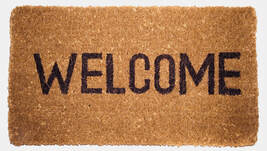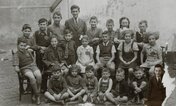weekly column
|
Each week, find a commentary on something connected to verses of Torah or another source of wisdom
|
|
Each week, find a commentary on something connected to verses of Torah or another source of wisdom
|
 The Last of Deuteronomy Therefore, when the Lord your God grants you safety from all your enemies around you, in the land that the Lord your God is giving you as a hereditary possession, you shall blot out the memory of Amalek from under the heaven. Do not forget. Deuteronomy 25:19 Deprived of movie theaters and live venues during this pandemic, we spend a lot of time watching movies and streaming series on television. There is a limited universe of actors, and inevitably we will recognize someone from something else we have watched. Olivia Coleman, for example, seems to be in every British production of the last ten years. Binge-watching may be an unusual way to learn an existential lesson, but I have come to a better understanding of the difference between remembering and not forgetting (likewise, forgetting and not remembering) in the two most frequent questions my wife and I ask each other in front of the TV. The first is “did we see that already?” The second is “what was she in?” The first question is about forgetting. If a movie or show has made a lasting impression on us, it will come to mind when we see the title or, often, any snippet from it. I can rattle off dozens of my most unforgettable movies, including “Casablanca,” “The Wizard of Oz,” “Animal House” and, believe it or not, “Phantasm.” (I was so scared after a late-night showing of that movie that I drove straight home, not bothering with streets.) There is no effort in recalling what I haven’t forgotten. The pleasure or, God forbid, trauma has taken up residence in an accessible place in memory. The tragedy of memory loss includes the deterioration of that automatic response. The second question is about remembering. With or without a hint of recognition, remembering is an active process of retrieval. Where did I see that baby-faced actor who played Benny in “The Queen’s Gambit?” There is an almost physical effort involved as I mentally scan the scenes in which his image flickers until I figure it out. (Oh, yeah. Thomas Brodie-Sangster, the kid in “Love Actually,” minus the ‘stache.) Re-member-ing literally involves putting pieces back together, some of which are more accessible and some much less. What does it take for an experience to be unforgettable, to live close enough to the surface that it is with us constantly? There is a better chance of it when strong emotion is attached or, similarly, a profound sensory encounter. Witnessing the desert awaken to the morning sun, the passionate telling by a friend of his conversion, the sound of laughter after reciting an original joke, the electric anticipation when my courage overcame my insecurity as I leaned into my first kiss – these are unforgettable experiences. I do not have to be instructed “do not forget.” They are resident and accessible. So, too, are traumas, both physical and emotional. Like the hammer that misses a nail and leaves an impression on the wood, a blow to the heart or to the body makes for a visceral memory that is right at the surface. Light will reflect, liquid will pool, dust will collect differently, with or without intention. It is logical, even sensible, to encourage someone whose memories are painful to try to forget. After all, the constancy of that unforgettable memory can take over an entire life and even lead people to repeat the familiar but undesirable behavior. An entire discipline of medicine is devoted to relieving rather than reliving. Amalek, mentioned in the verse, was the hammer that purposely missed the nail. The trauma of gratuitous violence against the small and lesser-abled – Amalek’s crime – left its indelible mark on the generation that fled from oppression. To be sure, they would never forget. But the atrocities were visited only on that generation, and so to prevent them from being committed by some other Amalek, they had to be remembered. The story had to be told because the pain would eventually be forgotten. It seems to be a paradox – remember so as not to forget. The pain of our recent sufferings will not be forgotten. But if we are to prevent them from being repeated in the future, then it is important that we don’t forget to remember.
0 Comments
 The Last of Deuteronomy When you enter another man’s field of standing grain, you may pluck ears with your hand, but you must not put a sickle to your neighbor’s grain. Deuteronomy 23:26 When I was eight years old, my family moved from the city environs of Chicago to the village of Wilmette. Today, it’s pretty clear that Wilmette is a close-in suburb of a metro area that extends almost to Wisconsin, but in 1960 housing developments were popping up on land that had been mostly farms. The eastern section of the village had been well-populated for a long time, but we moved to a house at the dead end of a brand new street, and beyond that dead end were the remnants of a chicken coop and then a small working farm. Even as our neighborhood expanded, the family farm remained active. Two aging sisters planted modest crops and flowers and sold them (and pullet eggs) from a roadside stand. There was no fence around the farm and only a dirt driveway onto the property. I remember the summer day I found out that a couple of brothers from the neighborhood on the other side of the farm discovered the crops. For them, refugees from the concrete, it was miraculous that there was food growing from the ground virtually in their backyard. They proudly brought home an armload of eggplants to their mother. She was, of course, mortified and took the boys to the farm to apologize and offer to pay for the purloined vegetables. The sisters were very gracious. They all lived happily ever after. We hear a lot of noise these days about the abandonment of Biblical values. In the very complicated discussions about the differences that technology and medical science have made in our lives, there are people with various perspectives who claim to know what Moses anticipated about transfusions, abortions, electricity and even Twitter. We don’t much hear about the abandonment of concern for one another that the Bible makes very clear. A friend of mine, who also happened to grow up in Wilmette as a Chicago transplant, worked in Washington on federal policies involving the poor. I found his approach to be lacking a certain compassion (I say euphemistically) and told him so. He wasn’t having any of it. Rather, he claimed, the ideas he advanced were about dignity. Certainly, the unemployable needed to be sustained, but those capable of providing for themselves should have the opportunity to do so, not the excuse to have their productivity devalued. Our society values work, he said, and at least as important as income was a sense of worth. In these two very different anecdotes there is a quiet countercultural idea. The sisters, perhaps inspired by the Biblical mandate, placed hospitality over cost. The policymaker understood financial support to be a byproduct of personal dignity rather than a substitute for it. In other words, even in this capitalist society, worth and value are not the same thing. The social contract that rightly should be presumed puts people ahead of money. That probably borders on heretical in a free-market economy, but the Bible does not commend or condemn the various economic systems in which it has been read and studied. It originated in a time when, if you were hungry – not even starving, just hungry – it could be presumed that your neighbor or even the farmer along the road you were traveling would let you grab a pomegranate or a handful of figs or a fistful of wheat stalks and feed yourself. The caution not to abuse the privilege by harvesting what you did not plant and tend is a recognition that people have rightful claim on and pride in the fruits of their own labors. In our country, helping yourself to an apple from a stranger’s orchard can get you arrested. Taking a bedraggled passerby into your home is considered reckless and foolhardy. Handing a stranger a dollar bill is cause for mockery. The times we live in are certainly different than Biblical times and even those days of my childhood. There are no more neighborhood farms in Wilmette. The social safety net for the poor has been reimagined many times. Now, unfortunately, it is all about the Benjamins. We measure success by wealth and celebrate our values by charitable donations (and, often, the tax advantages they bring). From both the grassroots and the ruling elite, only a return to hospitality toward others and a concern for their dignity will we find a more authentic religious standard for a just society. (please note -- this week's column is posted out of order. Sorry!)  The Last of Deuteronomy Always remember that you were a slave in the land of Egypt; therefore do I enjoin you to observe this commandment. Deuteronomy 24:22 There are at least two schools of thought about Holocaust education. One seeks to honor the memory of those who perished at the hands of the Nazis. The other seeks to honor the memory of those who lived before the Nazis. I hope it is obvious that I am describing the same group of people. The Jewish population of pre-World War II Europe was a flourishing and diverse world. More than just small towns that inspired “Fiddler on the Roof,” more than just Freud and Herzl and Karl Marx, more than manufacturing entrepreneurs and professional scholars, the world of Jews from Ukraine to Greece was as variegated as that of Europe as a whole. When we think about what we lost, we must think of all the things we were. The Jewish population of the concentration camps was stripped of its diversity to be dressed in striped uniforms and shaved heads. If you have watched films or seen still photographs of the enslaved laborers and those lined up for extermination, it is nearly impossible to distinguish between the sophisticated and acculturated secular Jew of Budapest and the poor and pious Jew of Horochov. Each victim stands for all the victims; all the victims are every victim. The experience of slavery in Egypt was defining for the generation of the Exodus. The life of servitude constituted the conversation between the liberated Israelites and their children who were born to a free if nomadic life. What do you think was the nature of Exodus education? This question is not about only the traumas visited on Jews at either end of 3000 years of history (and in between, and since). Every oppressed people has a choice to make about memory; every traumatized person has a choice to make about memory. What should be preserved in memory and what should be allowed to fade? The sprawling historical mini-series trend on television in the 1970s explored this question in dramatic (and sometimes very commercial) fashion. Perhaps no example is more pronounced than “Roots,” the broadcast version of Alex Haley’s telling of his family history beginning with a Gambian man, Kunta Kinte, kidnapped and sold to slavers at about the same time as the United States was born. Haley’s book was remarkable, but the visual expression of the very last episode lifted the question at hand to an unforgettable moment. Completing a visit to Gambia, Haley (played by James Earl Jones) is startled by a local (played by Levar Burton) who comes running up yelling “Mr. Kinte! Mr. Kinte!” Burton played Kunta as a young man, and now appeared before his very distant cousin as the embodiment of all that was maintained and all that was lost. Remembering is an intentional act. (I will have more to say about it soon.) It involves choices about what to include in the present-day consciousness and how to frame past experience – personal or collective – in calling it to mind. It is, of course, impossible to recall everything; our brains don’t have room and our lives don’t have time. So our choices carry with them decisions about relative importance and the values they represent. Those choices have consequences not merely about the past. They also have impact on the future. I grew up remembering the destruction of six million victims of murder. Black and white photos of frightened and emaciated men, women, and children. Piles of corpses next to smiling Nazis. 93 innocent girls choosing suicide over sexual abuse (a suspect story, by the way). As an adult, I visited Poland’s camps – Majdanek, Treblinka and, of course, Auschwitz – and the grim detritus of the Warsaw ghetto, with the small monument at Mila 18. My remembering was not a personal choice as much as a collective one. I grew into a Jewish community insistent on its sense of anger and offense. Famously, the late historian Emil Fackenheim added a 614th commandment to the traditional roster: do not give Hitler a posthumous victory. Less emphasized (though not ignored) was the bounty of that Eastern European Jewish tradition. Its scholarship, music, art and literature continued the rich legacies of the previous centuries. The Yiddish language, bountiful in its expressiveness and sensibilities, dwindled in my generation as a secret language among parents and grandparents, but persisted like the mint that grew perennially in our garden of annuals. As a kid, and even to large extent as a student, this culture was unconnected to the losses of the Holocaust, but no less resident in my Jewish sensibilities. “Remember,” commands the verse from Deuteronomy, connecting memory to enslavement. Reminded to remember, we cannot help but think through that mandate. But beyond the choice to remember is the equally important choice of what to remember.  The Last of Deuteronomy The man who lay with her shall pay the girl’s father fifty [shekels of] silver, and she shall be his wife. Because he has violated her, he can never have the right to divorce her. Deuteronomy 22:29 Looking back, I can tell you the minute I stopped believing the Bible literally. It’s not that I was so faithful to the text before that, but if you had asked me if I believed in the inviolability of the text, I would have attributed any doubts in my mind about it to personal shortcomings. And it is not that I did not take personal exception to the standards of practice that had evolved from Biblical principle to traditional Jewish observance. I was (and remain) a team player – if those were the rules, I would stick with them. But on a summer morning shortly after I was ordained a rabbi, I became father to a baby girl. To be precise, it was 9:31 a.m. All sorts of emotions washed over me. For example, I had an overwhelming urge to call my parents and apologize for my entire childhood. More to the point, if I had to decide at that moment to affirm my daughter’s basic human rights or to affirm the authority of a rapist to control her life in perpetuity, I would have chosen the newborn over the old-time religion faster than you could say “Apgar.” I had just been ordained, so this theological earthquake could have been an existential crisis. And I don’t want you to think that during labor and delivery I was busy pondering the instruction on sexual misconduct in the Book of Deuteronomy. On the contrary, I was completely in awe of my wife, the medical team and, fortunately for my chosen profession, God, while the baby was being born. However, from this distant point in my adult life, I now know there was a shift in what I believed at that moment. Belief is not an all-or-nothing proposition. My friend Rabbi Lawrence Troster, too soon of blessed memory, wrote profoundly of the centrality of what he called “perfect doubt.” He meant it as a counterbalance to the medieval philosopher and super-Jew Moses Maimonides whose thirteen claims to “belief with perfect faith” about the nature of God have been the gold standard for a thousand years. A version of Maimonides’s declaration serves as the concluding hymn in many synagogues every Friday night (and other times) when a catchy melody and desire to get to the waiting cookies prevents a conversation about whether any of us indeed aspire to that level of certainty, including the inerrancy of the Bible delivered verbatim to Moses. Rabbi Troster insisted (around the same time he became the father of twin daughters) that such claims of perfect belief were dangerous, and that only principled skepticism could lift faith above ignorance. He was right. In my sojourns through the minefields of interfaith conversation, I struggle hard with my partners who affirm a certainty about God’s literal instructions. I suppose I have a desire to channel President Josiah Bartlett, publicly humiliating sanctimonious fundamentalists by selecting instructions like the one above and asking about implementing them. I don’t have a Troster-like sophistication to make the philosophical case; I just know that I, her father, and she, my daughter, should be unwilling to surrender her dignity if, God forbid, she were violently abused. I knew it intellectually as a young man. I knew it with a perfect faith as a new dad. So, there is a profound incredulity that I feel when I encounter kind and spiritual people who harbor such distrust in their own (God-given) skepticism. That it seems too often selective doesn’t help. But even those literalists who are willing to explain away difficult texts – like this one – insist that the internal logic of scripture resolves its own problems. They believe that human beings are here to obey the rules, not make them. Ask me what I think of the Bible these days and I am likely to answer that I believe it is always true, but not always accurate. That is to say, this sacred document (or, perhaps more accurately, this collection of sacred documents) originates in a well-spring of truth that is transmitted by people somewhat desperate to believe they got it right. And in my encounters with people of other traditions, I have learned the obvious truth that it is not just Bible-believers who make that mistake. Name your holy scripture and there will be believers who consider it literal and exclusive. That belief in literalness is a choice. What an irony it is that believers who proselytize others to choose to share their belief close the door to any other choice regarding that belief. Yet, every story of origins begins with a person making a choice, and from that choice flow other choices we make, every one of us every day. My baby girl exercised her right to choose the person she wished to marry. There was no coercion on anyone’s part, and I will not be receiving fifty silver shekels, now or ever. Like my love for the Bible, my love for her and my other kids has become more nuanced. It is a choice I make. |
Archives
October 2023
Categories |